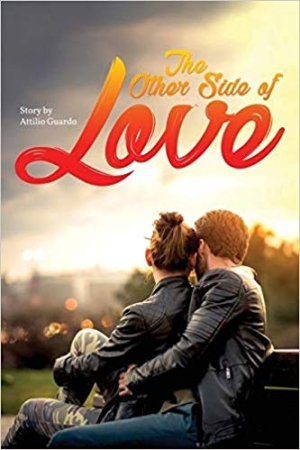The Other Side of Love
No one can predict how their desires will shift in the moody and swift novel The Other Side of Love.
A scorned lover convinces an old friend to help him seek retribution in Attilio Guardo’s dramatic revenge fantasy, The Other Side of Love.
Abandoned by Abigail, the woman he wanted to marry, Conrad is embittered. He vows vengeance against all womankind. He convinces an old army buddy, Ed, to date Abigail in jest, and then to break her heart once she’s fallen in love. Neither man plans for what happens next: Ed, though he had intended to rely on his skills as an actor and ventriloquist to maintain emotional distance from Abigail, falls in love with her in earnest.
Conrad is a melodramatic lead, prone to tempestuous fits of feeling. His love-cum-hatred for Abigail is expressed in bloated terms; he refers to her most often as a “bitch,” a descriptor he extends to most other women in his life, too. His moodiness is established in the first few pages, leading to predictable but frustrating turns in the story.
Abigail is constructed as silly and pliable and Ed as an affable dupe. Danger is suggested in the origins of their relationship, but despite dramatic threats of heartbreak and physical peril, concern for them is minimal. Secondary characters, including a pageant queen, a mobster, and an unattractive romance reader, rest in tropes. Most conversations are impeded by overformality, dramatic dialogue tags, and a tendency toward repetition.
The text is sodden with exposition. It focuses on specifics to excess when it comes to details like directions to Conrad’s mansion, the function of a lighthouse, or what a mission entails in military terms, but it evades delivering a more tactile sense of settings and situations. The time period is unclear, though references to food, fashion, and salaries have a retro sensibility.
The book’s romantic subplots are surface-level, lust-driven affairs, including the ended relationship that starts the story off. Abigail and Ed’s relationship progresses at an absurd rate, driven by flirtation, strategically placed whipped cream, and vague disclosures. Their sex scenes are awkward and their reconciliation midway through the book strains credulity.
Conrad’s behavior around women is off-putting, and that any of his connections persist beyond early exchanges is unbelievable. Additional women are added to the cast to suit his violent desires, but these story lines are brittle distractions. Conrad’s revenge fantasy magnifies and expands, pushing the novel in absurd directions and toward a campy ending; it offers the possibility of redemption, but it’s an unappealing prospect. Missing and incorrect punctuation marks, malapropisms, strange word choices, and misspelled words are a further impediment.
No one can predict how their desires will shift in the moody and swift novel The Other Side of Love.
Reviewed by
Michelle Anne Schingler
Disclosure: This article is not an endorsement, but a review. The publisher of this book provided free copies of the book and paid a small fee to have their book reviewed by a professional reviewer. Foreword Reviews and Clarion Reviews make no guarantee that the publisher will receive a positive review. Foreword Magazine, Inc. is disclosing this in accordance with the Federal Trade Commission’s 16 CFR, Part 255.

